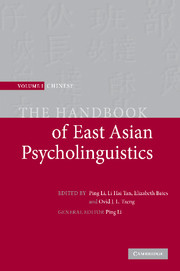Book contents
- Frontmatter
- Contents
- List of figures
- Notes on contributors
- Preface
- Introduction: new frontiers in Chinese psycholinguistics
- Part I Language acquisition
- Part II Language processing
- 14 Word-form encoding in Chinese speech production
- 15 Effects of semantic radical consistency and combinability on Chinese character processing
- 16 Eye movement in Chinese reading: basic processes and crosslinguistic differences
- 17 The Chinese character in psycholinguistic research: form, structure, and the reader
- 18 Perception and production of Mandarin Chinese tones
- 19 Phonological mediation in visual word recognition in English and Chinese
- 20 Reading Chinese characters: orthography, phonology, meaning, and the Lexical Constituency Model
- 21 Processing of characters by native Chinese readers
- 22 L2 acquisition and processing of Mandarin tones
- 23 The comprehension of coreference in Chinese discourse
- 24 Lexical ambiguity resolution in Chinese sentence processing
- Part III Language and the brain
- Epilogue: a tribute to Elizabeth Bates
- References
- Name index
- Subject index
24 - Lexical ambiguity resolution in Chinese sentence processing
Published online by Cambridge University Press: 05 June 2012
- Frontmatter
- Contents
- List of figures
- Notes on contributors
- Preface
- Introduction: new frontiers in Chinese psycholinguistics
- Part I Language acquisition
- Part II Language processing
- 14 Word-form encoding in Chinese speech production
- 15 Effects of semantic radical consistency and combinability on Chinese character processing
- 16 Eye movement in Chinese reading: basic processes and crosslinguistic differences
- 17 The Chinese character in psycholinguistic research: form, structure, and the reader
- 18 Perception and production of Mandarin Chinese tones
- 19 Phonological mediation in visual word recognition in English and Chinese
- 20 Reading Chinese characters: orthography, phonology, meaning, and the Lexical Constituency Model
- 21 Processing of characters by native Chinese readers
- 22 L2 acquisition and processing of Mandarin tones
- 23 The comprehension of coreference in Chinese discourse
- 24 Lexical ambiguity resolution in Chinese sentence processing
- Part III Language and the brain
- Epilogue: a tribute to Elizabeth Bates
- References
- Name index
- Subject index
Summary
The resolution of lexical ambiguity has been a main focus for the investigation of context effects in word recognition for the past twenty-five years (e.g. Hogaboam & Perfetti, 1975; Onifer & Swinney, 1981; Sereno, 1995; Simpson, 1981; Simpson & Burgess, 1985; Simpson & Krueger, 1991; Swinney, 1979; Tabossi, 1988; Tanenhaus, Leiman & Seidenberg, 1979). Most studies have been done on Indo-European languages (e.g. Dutch, English, and Italian), with little on non-Indo-European languages. In this chapter, we review studies on lexical ambiguity resolution in Chinese, a major Sino-Tibetan language, and show how they can contribute to our understanding of language processing. We begin with a review of models of lexical ambiguity resolution that have formed the main framework for studies on lexical ambiguity. Next we examine the different approaches used in this area. And then we discuss some linguistic properties of Chinese relevant to the study of lexical ambiguity, together with some recent studies conducted in our laboratories. Finally, we propose some directions for future studies.
Lexical ambiguity resolution: a test bench for modular/interactive theories
The fundamental purpose of language comprehension is the understanding of meaning. How is our language-processing system organized so meaning access is a rapid and accurate process? A central issue in psycholinguistics related to this question is whether the various language-processing subsystems (e.g. lexical and discourse subsystems) are interactive or modular in nature. The existing literature contains two opposing positions. Modular theory (Fodor, 1983; Forster, 1979) proposes the autonomy of the lexical processor.
- Type
- Chapter
- Information
- The Handbook of East Asian Psycholinguistics , pp. 268 - 278Publisher: Cambridge University PressPrint publication year: 2006
- 12
- Cited by



